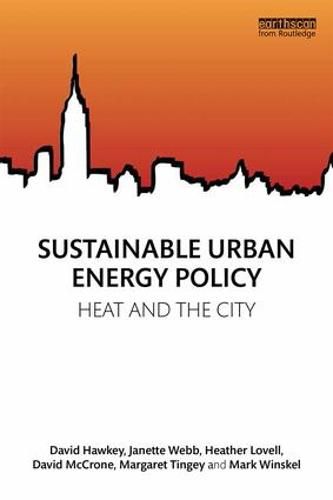Readings Newsletter
Become a Readings Member to make your shopping experience even easier.
Sign in or sign up for free!
You’re not far away from qualifying for FREE standard shipping within Australia
You’ve qualified for FREE standard shipping within Australia
The cart is loading…






Minimising the most severe risks of climate change means ending societal dependence on fossil fuels, and radically improving the efficiency with which we use all energy sources. Such deliberate transformative change is, however, without precedent.
Sustainable Urban Energy Policy debates the major public issue of developing a sustainable, clean and affordable energy system by adopting a distinctive focus on heating in cities. In this way, the book constructs an original account of clean energy policy, politics and provision, grounded in new empirical data derived from case studies of urban and multi-level governance of sustainable heat and energy saving in the UK and Europe. Offering an original conceptual framework, this study builds on socio-technical studies, economic and urban sociology, human geography, applied economics and policy studies in order to understand energy governance and systemic change in energy provisions.
This book is a valuable resource for students and academics in the areas of Science and Technology Studies, Sociology, Geography (Urban Studies) and Political Economy as well as energy policy makers, social housing providers and energy practitioners.
$9.00 standard shipping within Australia
FREE standard shipping within Australia for orders over $100.00
Express & International shipping calculated at checkout
Minimising the most severe risks of climate change means ending societal dependence on fossil fuels, and radically improving the efficiency with which we use all energy sources. Such deliberate transformative change is, however, without precedent.
Sustainable Urban Energy Policy debates the major public issue of developing a sustainable, clean and affordable energy system by adopting a distinctive focus on heating in cities. In this way, the book constructs an original account of clean energy policy, politics and provision, grounded in new empirical data derived from case studies of urban and multi-level governance of sustainable heat and energy saving in the UK and Europe. Offering an original conceptual framework, this study builds on socio-technical studies, economic and urban sociology, human geography, applied economics and policy studies in order to understand energy governance and systemic change in energy provisions.
This book is a valuable resource for students and academics in the areas of Science and Technology Studies, Sociology, Geography (Urban Studies) and Political Economy as well as energy policy makers, social housing providers and energy practitioners.